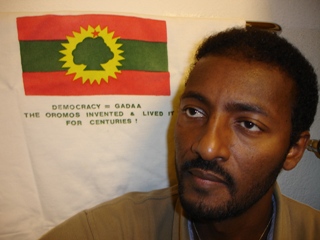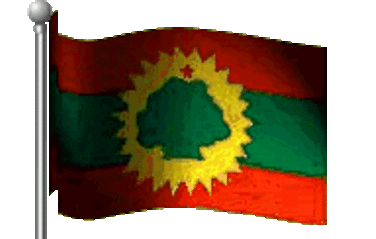Plight of ethnic groups in Ethiopia discussed at U conference
By Abdi Aynte , Minnesota Monitor
15,000 Oromo in Minnesota include many victims of torture, persecution.
Seldom does a former head of state express remorse about crimes committed under his watch, but that's exactly what Dr. Negasso Gidada, the former president of Ethiopia, told more than 100 people Thursday evening at the University of Minnesota.
Speaking at the Oromo second annual international human rights conference, Gidada said he's "ready to be accountable for crimes I committed … and those committed by the Ethiopian government" during his tenure.
Most of the people in attendance were Oromo, the largest of Ethiopia's 86 ethnic groups. Gidada also is an Oromo, but the current regime is dominated by a minority ethnic group called the Tigre. He held the largely ceremonial post of president between 1995 and 2001.
Now an opposition member in the Ethiopian parliament, Gidada admitted that the "rule of law was enforced brutally" while he was president. But he reiterated that he couldn't stop most of those crimes, because the power lied with the Tigre prime minister.
More than 15,000 Oromo refugees, the largest anywhere in the country, live in Minnesota, according to the Oromo-American Citizenship Council, which helped organize the event.
The State Department's human rights index ranks Ethiopia, a close U.S. ally in the war on terror, as one of the worst human rights violators in the world. Oromo-Americans said they are particularly disappointed with how the United States turned its back on the protection of human rights in their country.
Ethiopia is already fighting a proxy war for the U.S. in Somalia, said Professor Abdi Samatar, a panelist who teaches geography and global studies at the University of Minnesota.
"With blessings from Washington, the Ethiopian military killed thousands in Somalia since January, displaced 450,000 and destroyed one-third of Mogadishu's infrastructure," said Samatar, who studied Ethiopia closely as a Fulbright scholar seven years ago.
A study by the Minneapolis-based Center for Victims of Torture found in 2004 that 69 percent of all Oromo men and 37 percent of women in Minnesota were victims of torture -- one of the highest percentages among refugees in the state.`Color of your passport matters'
Minnesota is also home to the largest Anuak ethnic population in the United States. When Ethiopian soldiers were in the middle of killing more than 400 Anuak people in three days in 2003, Obang Metho, executive director of the Anuak Justice Council, called the U.S. State Department.
According to Metho, who also spoke at the event, the woman who answered his 1 a.m. call told him: "'People are killed over there all the time,'" and the phone went dead. Metho, who now lives in Canada, called back five minutes later. The woman chided him but before she could take her next breath, he interjected that U.S. citizens could be among the dead. Then he hung up on her.
The woman called back with a frantic question: "'Do you know where they live? Their Social Security numbers?'" Metho supplied whatever information he had.
Less than two hours later, he received a call from the U.S. embassy in Addis Ababa, informing him that staff members were on the way to Gambella, where the massacre was under way. But they needed his help.
"At that time, I learned that the color of your passport matters," he said.Hope in legislation
Members of the Ethiopian community in Minnesota and across the nation, who organized a massive rally Thursday morning at the state Capitol, are hoping for eventual passage of a bill that cleared a subcommittee in the U.S. House of Representatives last week.
The bill, authored by Rep. Donald Payne, D-N.J., connects U.S. financial and military assistance to Ethiopia to improved human rights, freedom of the press and democracy.
U.S. Rep. Keith Ellison, D-Minn., who spoke at the Oromo human rights conference through video uplink, told the audience that he supports the bill.
"Those who committed human rights violations ought to be brought to justice," he said.



0 Comments:
Post a Comment
<< Home